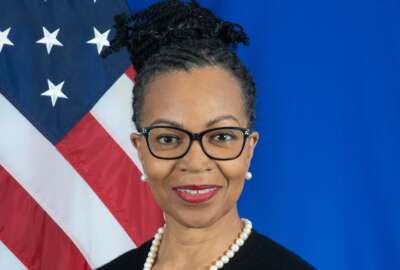The State Department is gearing up for a significant hiring surge, if Congress approves a budget on par with the Biden administration’s request for fiscal 2022.
The State Department would add 500 new Foreign and Civil Service positions to its ranks, if it and the U.S. Agency for International Development get the $58.5 billion budget outlined in the administration’s budget request.
The department is also looking to make 70 hires focused on global health security that would oversee international COVID-19 vaccine efforts led by the U.S.
Secretary of State Antony Blinken told the House Foreign Affairs Committee Monday that the proposed staffing increase would be the largest of its kind in a decade. The budget, Blinken said, would also build up the department’s portfolio of work focused on emerging technology and climate.
“We have significant vacancies to fill and we also have to have new positions in order to deal with many of the challenges that have already been alluded to this morning, where we are understaffed or under-resourced,” Blinken said.
The Biden administration’s 2022 budget would increase civilian agencies’ discretionary spending by 16%, and would support a hiring spree within the federal workforce.
The budget request would support efforts in Congress to not only staff up the department’s emerging tech portfolio, but also address longstanding diversity and inclusion challenges.
Committee Chairman Gregory Meeks (D-N.Y.) applauded the administration’s request to more than double funding for diversity and inclusion programs. But Meeks also pressed the agency for more specifics on the steps it’s taking to address retention and promotion barriers for racial and ethnic minorities who work in the department’s senior ranks.
The House passed a State Department reauthorization bill last month, which establishes recruitment, retention, and promotion requirements for the department, with a focus on building a more diverse workforce. The bill would also require the department to submit a five-year strategic staffing plan.
Meeks also pressed the department to offer paid internships as part of a multifaceted effort to diversify its pool of talent.
“Internships help open the doors to careers in foreign affairs, and without a paid internship program, these opportunities are accessible only to those from more affluent backgrounds. A paid internship program would help broaden the pool of candidates interested in pursuing a career in public service at the State Department,” Meeks said.
Blinken said the department is finalizing a diversity and inclusion data report, which breaks down the demographics of its workforce. He said the department will release the data in the coming weeks.
The department has also stood up a task force running an internal audit on “assignments restrictions,” which prohibit certain employees from working on issues related to certain countries.
“We’re basically looking at both the broader policy and individual cases, and I am determined that we’ll leverage diversity and the skills of our workforce in ways that make the department and our foreign policy more effective,” Blinken said.
Rep. Ted Lieu (D-Calif.) urged Blinken to put an end to assignment restrictions, saying the practice hurts recruitment and retention, and effectively bars career employees from promotions within their fields based on their ethnicity.
“It’s basically telling a number of State Department employees that we believe you’re going to be a traitor, that given a choice between the United States of America and the foreign country in which you’ve been given an assignment restriction, that we believe you are going to pick that foreign country,” Lieu said.
Lieu, an Air Force veteran, added that the Defense Department doesn’t have a similar policy to determine whether employees can access sensitive information.
“I was granted a top-secret security clearance. The Department of Defense, they didn’t then come in and say, ‘Hey, we’re going to give you an assignment restriction and not let you serve in U.S. Pacific Command because you have family members that live in Taiwan,’” Lieu said.
Several members also pressed Blinken to elevate cybersecurity matters into the department’s diplomacy work.
Rep. Bill Keating (D-Mass.) urged Blinken to do more to deal with an “escalation” of cyberattacks. The House in April passed the Cyber Diplomacy Act, which would stand up a Bureau of International Cyberspace Policy at the department, led by an ambassador with the same rank and status as an assistant secretary of state.
Blinken said the administration is working on a “whole of government” strategy to counter a rise in ransomware attacks. The strategy will include building international coalitions to hold countries accountable if they harbor malicious cyber actors. The strategy would also focus on tracking down cryptocurrency payments that fuel ransomware attacks.
Blinken also said the White House will put pressure on nations like Russia accused of supporting cyberattacks. Biden on June 16 will meet with Russian President Vladimir Putin in Geneva.
“One of the things that President Biden will make clear to President Putin, when he sees him, is that states cannot be in the business of harboring those who are engaged in these kinds of attacks,” Blinken said.
Blinken said the department is also working internationally to promote security standards around emerging technology, including 5G, to make sure countries make the security of this infrastructure a top priority.
Copyright
© 2024 Federal News Network. All rights reserved. This website is not intended for users located within the European Economic Area.

